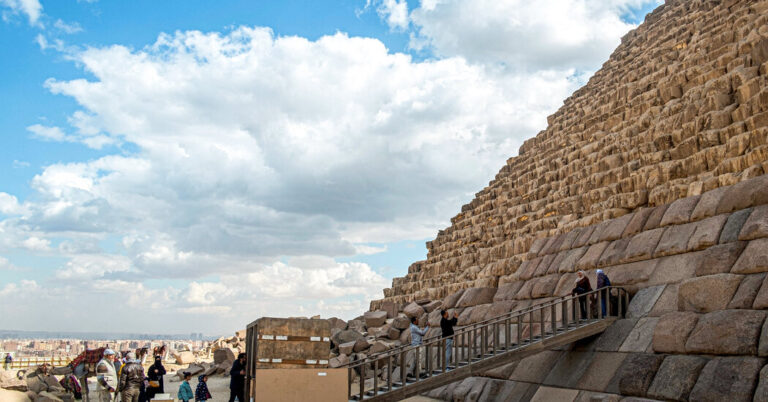Over the centuries, many of the granite stones fell off or were removed from the site for a variety of reasons, according to Morgan Moroney, the assistant curator of Egyptian, Classical, and Ancient Near Eastern art at the Brooklyn Museum. Even in ancient times, she said, people reused them to build nearby monuments or houses. Earthquakes, erosion and vandalism wore away at them over the centuries.
Salima Ikram, the head of the Egyptology unit at the American University in Cairo, is cautiously optimistic about the new project.
“Scanning and documenting the pyramid and the blocks on the ground is very useful,” she said. If the team were to put the fallen blocks back in place in a way that is reversible, she said, it would be “eminently sensible.” But she cautioned against restoring any blocks if their origins are unclear and suggested that further study would be necessary to confirm that the pyramid could still support the weight of more granite cladding.
Ibrahim Mohamed Badr, an associate professor in the department of antiquities restoration and conservation at Misr University of Science and Technology in Giza, was skeptical about which stones on the site — many of them unpolished — could be confirmed as original to the pyramid.
“The ancient Egyptians would have polished the blocks when installing them in the pyramid itself,” he said. “Any attempt to fix and polish them would be a blatant interference in the work of the ancient Egyptians, who did not complete this pyramid.”
The Ministry of Antiquities did not respond to a request for comment or confirm the project’s budget. Waziri told al-Mehwar TV that the initial phase of the project — which is beginning at a time of soaring debt and inflation in Egypt — was being funded entirely by his Japanese partners. “We will not pay a dime,” he said.
The Menkaure project is part of a broader investment in Giza’s infrastructure, which includes new restaurants and visitor facilities. The Grand Egyptian Museum, which reportedly cost $1 billion and has been in the works for two decades, is poised to open later this year.
Nada Rashwan contributed reporting from Cairo.



